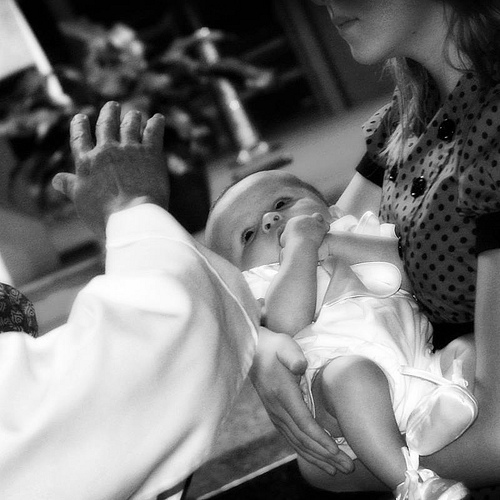
Reflecting on Lessons for Monday – Wednesday of Holy Week, Year A
Monday, April 6 Hands That Bless
Focus Lesson: John 12:1-11
Additional Daily Lessons: Isaiah 42:1-9; Psalm 36:5-11; Hebrews 9:11-15
Theme: God’s faithful and generous people use their hands to bless, even in the midst of uncertainty and pain.
Context: This Sunday we remember how Jesus entered Jerusalem in a triumphal politically charged bit of street theater. Expectation, excitement, and fear are running high through Jerusalem (and probably also in many of our current contexts). The forces of love and evil, God and empire, are set to collide. Today Jesus cleans out the temple and curses a fig tree for not bearing fruit (think the events at the Temple were on his mind?). That night he is a dinner guest at the house of Lazarus, Mary, and Martha. Mary anoints Jesus’ feet with expensive fragrant oil and her tears and then wipes them with her hair. She gives her most vulnerable all, the very best she has, to bless Jesus with her love and trust.
Key Scripture: Mary took a pound of costly perfume made of pure nard, anointed Jesus’ feet, and wiped them with her hair. The house was filled with the fragrance of the perfume. -John 12:3
Gratitude Connection: Sit for a few minutes and reflect on those who have blessed you in various ways. How did it feel to receive their blessing? Perhaps it was an unexpected and perfect gift, a home-cooked meal, a prayer, a phone call just when you needed it; hold that story in your heart and feel the blessing anew. Offer a short prayer of gratitude for those who have blessed you. Now, ponder how you might be a blessing to someone else today (see Digging Deeper for ideas). Ask God to lead you to be that most needed blessing and to guide your heart, mind, and words. Find a way to be hands that bless others. In doing so, you will also be blessed.
Reflection: Imagine pouring yourself out for the sake of the world, for the sake of divine love. How might you feel if you stepped into Mary’s place and poured out your most lavish and costly possession to show your love for and trust in Jesus? See how your tears flow, mingling with the rich scented nard oil onto the hard-working feet of the one who has radically changed your life. Can you begin to imagine the scene, smell the rich fragrance?
Judas evidently can’t stand seeing the oil poured out and wasted, about a year’s wages according to scholarly sources. His ostensible reason is that the money can be better used to help the poor, but Jesus silences him and defends Mary. The gospel author makes it clear that Judas’s intentions are not honorable, that he doesn’t grasp his rabbi’s radical teachings. Mary, however, does get it. She uses all that she has of value to bless and anoint the one she loves with all her heart, mind, and soul.
We, too, have the opportunity to use our hands to bless. Whenever we work for the good of all creation and all God’s beloved people, we use our blessing to be the hands of blessing to others. God’s economy is built on the principle of abundance and blessing. It is our broken and anxious human hearts and hands that hoard and fail to distribute the abundance in a way that ensures a decent life for all.
Jesus won’t force us to be a blessing in his name, but he does invite us to enter fully into his way and will. If we draw near to the Christ and keep our focus on him, then we will be equipped and inspired to bless. After all, blessing, love, and mercy are God’s nature and what God desires for all of us.
Digging Deeper: If you are at home with family, end your devotional, dinner, or gathering time with an order for blessing. If you have essential oil and carrier oils like coconut, almond, or even olive oil at hand, blend a small amount of fragrant oil with the carrier oil in a small dish. Write simple blessings for one another, perhaps using Numbers 6:24-26 for guidance. Read your written blessings and anoint the family member you wish to bless. Dip your pointer finger or thumb in the oil and make the sign of the cross on that person’s forehead or hands.
If you are by yourself or don’t want to mess with anointing, write a quick note or card to someone. In this time of physical/social distancing, just a few words of encouragement and a meaningful scripture passage can be a real blessing. You might want to send a note to local hospitals to bless and thank the medical teams who are working so hard to preserve life and care for the sick and dying.

Tuesday, April 7 Hands Hold Loosely; Hands Release
Focus Lesson: John 12:20-36
Additional Daily Lessons: Isaiah 49:1-7; Psalm 71:1-14; 1 Corinthians 1:18-31
Theme: God’s faithful and generous people use their hands to hold loosely and to release, realizing that grasping and hoarding run counter to God’s intent.
Context: Jesus returns to the Temple and debates with the religious authorities and scholars. He leaves the city for the Mount of Olives where we hear him speak about the end of the age. The tide is turning from a joyous wave of hope to an incoming storm of despair and dis-ease.
Key Scripture: 24 Very truly, I tell you, unless a grain of wheat falls into the earth and dies, it remains just a single grain; but if it dies, it bears much fruit. 25 Those who love their life lose it, and those who hate their life in this world will keep it for eternal life. –John 12:24-25
Gratitude Connection: A gift isn’t a gift if it comes with strings attached. That’s why followers of Jesus learn from him to hold everything loosely and to be ready to release everything in its time. This is a hard lesson because we humans are conditioned to expect something in return for our gifts. Think about the gift you have given in the past. Can you think of a gift you gave with absolutely no expectations but only joy in being able to give? What was that experience like? Have you ever put conditions on a gift or given it with “silent strings” of expectation or response? How was that experience? Was there a difference in the two “giving experiences”? God gives to us with no strings or expectations. It is God’s good pleasure and nature to give, and the Creator wants us to experience this joy of giving, too. Pray that God will help you to hold loosely, give freely, and unleash love and joy on the world.
Reflection: In today’s appointed gospel lesson Jesus speaks of his upcoming death. He is beginning the separation from his disciples that is soon to happen; something that must happen in order for this cosmic grain of wheat to produce new fruit of eternal significance. Remember that expectations, hopes, and fears are running high in Jerusalem, and many folks, including at least some of Jesus’ disciples, have a set image of a Messiah king who will topple empire and restore the right order to Jerusalem. They are so clinging tightly to this image and hope that they can’t understand that Jesus is up to something much bigger in scale and decidedly different.
Well, human nature hasn’t changed much, has it? We still have a hard time seeing beyond our own ideas, notions, and experience. We are blinded to so much possibility and hope when we cling too tightly to almost anything. Releasing is scary because it is one more reminder that we are not in control.
I have to admit that at this stage of my life it is pure relief to finally embrace my lack of control and give thanks that God is and I’m not. The blessing comes in holding lightly to all of life and being willing to release and be emptied, while trusting there is more in God’s grace-filled grip.
Life, and our faith communities, may look considerably different when we emerge from the physical and social distancing necessary to address COVID-19. How will you respond? Will you hold loosely and be willing to release whatever needs to go? My prayer for our world is that we will release what needs to go and embrace the newness that God is already seeding while we are compelled to Sabbath. Are you willing to lose the safe, the familiar, or the nostalgic in order to bear abundant fruit for a new time? God can do a lot more through open hands, hearts, and minds. I pray that in this time we will commit to hold space (loosely) for God’s work by our hands.
Digging Deeper: To what have you been clinging too tightly? What might you need to release? How might it feel to relax your hold on some things that tend to get in the way of your relationship with Christ? How could releasing help prepare you to receive something new?
If you have family with you, see how many examples you can think of where holding too tightly to something can cause a problem. I learned, for example, that you hold loosely to the steering wheel on gravel roads rather than clinging to it in fear. Give thanks to God for hands that can hold loosely and release when needed. Ask God to help give you flexible hands.

Wednesday, April 8 The Hands of Betrayal
Focus Lesson: John 13:21-32
Additional Daily Lessons: Isaiah 50:4-9a; Psalm 70; Hebrews 12:1-3
Theme: God’s faithful and generous people know that the same hands that bless can also betray.
Context: The religious leaders have had enough and are ready to move against Jesus. Judas, one of Jesus’ own disciples, conspires with them. The wheels of betrayal and destruction now turn.
Key Scripture: After he received the piece of bread, Satan entered into him. Jesus said to him, “Do quickly what you are going to do.” -John 12:27
Gratitude Connection: Have you ever had one of those days that’s a nightmare from moment one? It’s tough to be grateful when you when you’re in the thick of dismay and disaster. Jesus knows this, and he is always with us, sustaining us in our weariness, finding ways to speak a word to us that redirects our wandering way. If you can’t see Christ’s presence while you’re in the midst of the struggle, take time to reflect after the fact and pray to see and understand how Christ was with you all along. Look for the bad, and you will surely find it. Look for the good, and you will surely find it. Look for the good and give thanks.
Reflection: Yes, the same hands that bless can also betray; this is a hard truth to swallow. We are, as Augustine and Luther stress, simultaneously saint and sinner. Humans are capable of great good and devastating evil. When we align our hearts and minds with Christ, we learn to cultivate and celebrate the good and lasting, to grow into our full potential, to practice discipleship.
We may feel powerless to address the evil and betrayal that is all too real. We may also be tempted, like Judas, to take matters into our own hands and seek to control or circumvent the divine will. Left to our own devices, our hands may turn from blessing to betrayal, from helpful to destructive, and from grounded and centered to fragmented.
Some scholars believe that Judas may have been trying to spur Jesus to political and violent action, to take an earthly throne in a show of power. We can only ponder how we might have responded in similar circumstances. Would we act differently, or would we mirror the disciples in their response to Jesus’ arrest, trial, and crucifixion?
Perhaps an answer is found in today’s lesson from Isaiah: “The Lord God has given me the tongue of a teacher, that I may know how to sustain the weary with a word” (50:4). Jesus understands how easy it is for hands of blessing to become those of betrayal. He understands our weariness, anxiety, fickleness; he offers us a better way. By connecting to the Christ, our divine teacher, we are far less likely to allow our hands to betray both others—and indeed our very own selves.
Digging Deeper: Have you ever been on the receiving end of a betrayal? Perhaps a friend let you down or publicly humiliated you. Perhaps a promise made was quickly broken. How did you feel? What helped you get back on track? What did you learn? Now, take the opposite approach. Have you ever been the betrayer? How did you feel? What were the consequences and any collateral damage from your betrayal? What did you learn?
Spend some time in quiet prayer or journaling and ask God to help you learn how to use your hands for blessing rather than betrayal. Be as specific as you want to be or as general as you need to be. Trust that God has the power to work through anything, including the hardest heart.
Practice asking these simple questions whenever you are faced with a decision that might lead you to use your hands for ill: 1) Will the action I am about to take build up or tear down? and 2) Will I be blessing in Jesus’ name or betraying out of my own needs and instincts?
Next Up: Look for Maundy Thursday ideas on “Hands that Serve,” followed by Good Friday’s “Hands that Grieve,” and a “Handmade Family-friendly Easter Vigil.” Check back daily for updates. Blessings on your Holy Week!




Leave a Reply